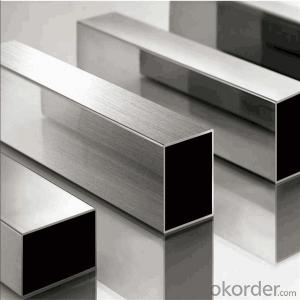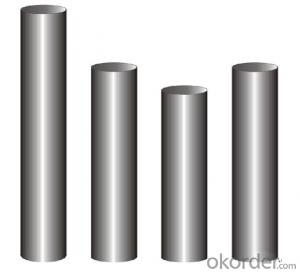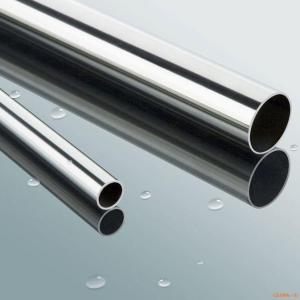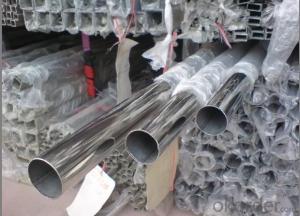904L Super Duplex Stainless Steel Pipe in Wuxi ,China
- Loading Port:
- Shanghai
- Payment Terms:
- TT OR LC
- Min Order Qty:
- 2 m.t.
- Supply Capability:
- 25000 m.t./month
OKorder Service Pledge
OKorder Financial Service
You Might Also Like
Item specifice
Own Brand Name | SENYU | Business Type | manufacturer |
standard specifications | ASME/ANSI, JIS, DIN, EN,GOST | Product Range | Stainless steel seamless pipes and tubes |
Export Percentage | 60% | Export Markets | Middle east, south and east Asia, Russia, South America |
Sales Volume | 300,000,000 (300million) | Primary Competitive Advantages | High quality, Favourite price; Prompt Delivery |
No. of Production Lines | 18 | Investment on Manufacturing Equipment | 20,000,000(20million) |
NO.of R&D Staff | 6 | NO.of Total Staff | 300 |
Annual production capacity | 11000TONS | No. of Engineers | 20 |
Year Established | 1992 | Monthly Capacity | 1200 tons |
Pipe Billet | Tsingshan,Yongxing,Baosteel,Jiuli | Factory Size in Square Meters | 33333 SQ.M |
Certificates | ISO9001:2000; DNV,GOST | Current Principal Customers: | sinopec, CNPC, nuclear plant |
Type of Machinery | cold drawn machine, cold rolling equipment, broaching machine, automatic solution annealing furnaces, straighteners, test equipment | Capital | WENZHOU SENYU STEEL PIPES FACTORY 8,500,000RMB
|
904L is a fully austenitic structure, and the general content of high molybdenum austenitic stainless steel, 904L is not sensitive to the precipitation of the ferrite and the alpha phase.
Application
1. petroleum, petrochemical equipment, such as petrochemical equipment in the reactor, etc..
2. Storage and transportation equipment, such as heat exchangers, etc..
3. Power plant flue gas desulfurization device, the main use of the site are: absorption tower body, flue, file door, interior, spray system, etc..
4. Organic acid treatment system of scrubber and fan.
5. Seawater treatment plant, sea water heat exchanger, paper industry equipment, sulfuric acid, nitric acid equipment, acid, pharmaceutical industry and other chemical equipment, pressure vessels, food equipment.
6 .Pharmaceutical factory: centrifuge, reactor, etc..
7. Plant food: cans of soy sauce, cooking wine, salt, and dressing equipment.
8. Most suitable for dilute sulfuric acid and strong corrosive medium
Surface Finish :
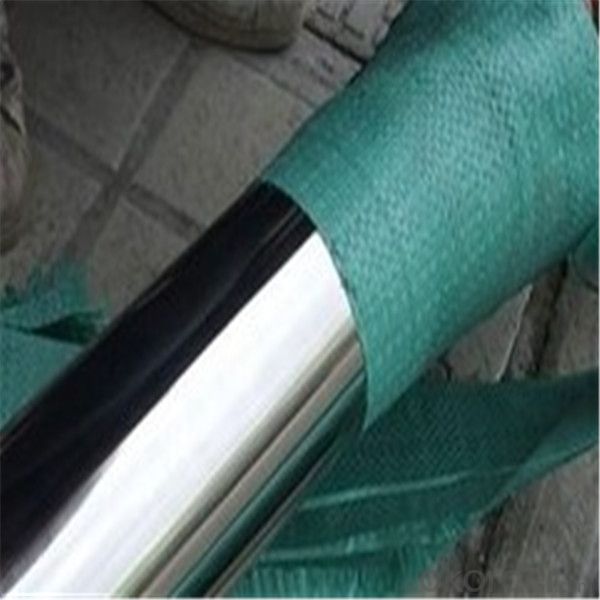
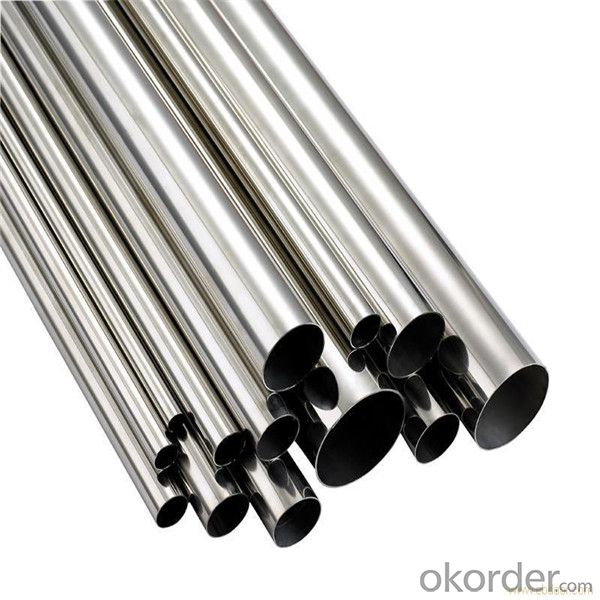
- Q:Are stainless steel pipes resistant to chemicals?
- Stainless steel pipes are generally resistant to chemicals, thanks to their corrosion resistance properties. This quality makes stainless steel an ideal material for various applications, including pipes that come into contact with different chemicals. The presence of high levels of chromium in stainless steel forms a protective layer on its surface, preventing it from reacting with most chemicals and corrosive substances. However, it is important to consider that the resistance of stainless steel pipes to chemicals can vary depending on the specific type and grade of stainless steel used. In certain cases, aggressive chemicals or extreme conditions may still cause corrosion or damage to stainless steel pipes. Therefore, it is always recommended to seek advice from experts or refer to chemical resistance charts for accurate information regarding the compatibility of stainless steel pipes with different chemicals.
- Q:Can stainless steel pipes be used for gas distribution?
- Yes, stainless steel pipes can be used for gas distribution. Stainless steel is a highly durable and corrosion-resistant material, making it suitable for a wide range of applications, including gas distribution systems. It provides excellent resistance to the corrosive effects of gases and moisture, ensuring the integrity and safety of the gas distribution network. Additionally, stainless steel pipes have high tensile strength, which allows them to withstand high pressure and temperature conditions commonly encountered in gas distribution. Moreover, stainless steel is non-reactive and does not release harmful substances into the gas stream, making it a reliable choice for transporting gases. Overall, stainless steel pipes are a preferred choice for gas distribution due to their durability, corrosion resistance, and high safety standards.
- Q:What is the maximum operating temperature for stainless steel pipes?
- The specific grade of stainless steel used can cause the maximum operating temperature for stainless steel pipes to vary. Nevertheless, stainless steel pipes, on the whole, can endure high temperatures. Typically, austenitic stainless steel grades like 304 and 316 are capable of handling temperatures up to 870°C (1600°F). Conversely, ferritic stainless steel grades like 430 have a lower maximum operating temperature of approximately 760°C (1400°F). To determine the precise maximum operating temperature for a specific stainless steel grade and pipe, it is crucial to refer to the manufacturer's specifications and guidelines.
- Q:How do you calculate the heat transfer coefficient of stainless steel pipes?
- The heat transfer coefficient of stainless steel pipes can be calculated using empirical correlations or experimental measurements. Empirical correlations involve using equations that relate the heat transfer coefficient to parameters such as the flow rate, pipe diameter, and fluid properties. These correlations are often based on extensive experimental data and can provide reasonably accurate estimates. Alternatively, experimental measurements involve directly measuring the temperature difference across the pipe wall and the heat flux. By dividing the heat flux by the temperature difference, the heat transfer coefficient can be obtained. However, experimental measurements can be more time-consuming and may require specialized equipment.
- Q:How do stainless steel pipes compare to PVC-coated steel pipes?
- Stainless steel pipes and PVC-coated steel pipes have distinct differences in terms of material composition, durability, corrosion resistance, cost, and specific applications. Firstly, stainless steel pipes are made from a combination of iron and chromium, which provides excellent corrosion resistance and durability. This makes them suitable for applications in harsh environments, such as industrial settings or marine applications. On the other hand, PVC-coated steel pipes are made from steel coated with a layer of polyvinyl chloride (PVC). While PVC provides some level of corrosion resistance, it is not as durable as stainless steel and may degrade over time, especially in high-temperature or corrosive environments. In terms of durability, stainless steel pipes have a longer lifespan compared to PVC-coated steel pipes. Stainless steel is highly resistant to rust, corrosion, and chemical damage, ensuring long-term reliability. PVC-coated steel pipes, although corrosion-resistant to some extent, are more prone to damage from exposure to sunlight, extreme temperatures, or chemicals. When it comes to cost, PVC-coated steel pipes are generally more affordable compared to stainless steel pipes. This makes them a cost-effective option for applications that do not require high levels of durability or corrosion resistance. Stainless steel pipes, while more expensive upfront, offer a better return on investment due to their longer lifespan and reduced maintenance costs. The specific application also plays a crucial role in determining which type of pipe is most suitable. Stainless steel pipes are commonly used in industries such as oil and gas, chemical processing, food processing, and water treatment, where high strength, corrosion resistance, and hygiene are essential. PVC-coated steel pipes find application in areas such as underground drainage, irrigation systems, and electrical conduit, where cost-effectiveness and moderate durability are more important than extreme corrosion resistance. In summary, stainless steel pipes outperform PVC-coated steel pipes in terms of durability, corrosion resistance, and lifespan. However, PVC-coated steel pipes offer a more cost-effective solution for applications that do not require the same level of durability or corrosion resistance. Ultimately, the choice between these two types of pipes depends on the specific needs of the project, including its intended application, budget, and environmental conditions.
- Q:What are the different types of stainless steel pipe bends?
- There are several different types of stainless steel pipe bends, including 45-degree, 90-degree, and 180-degree bends. Additionally, there are short radius and long radius bends, as well as U-bends and J-bends. These variations allow for flexibility in designing and connecting stainless steel piping systems to fit specific needs and spatial constraints.
- Q:What is the impact strength of stainless steel pipes?
- The impact strength of stainless steel pipes is generally high, as stainless steel is known for its toughness and resistance to impact and deformation. However, the exact impact strength can vary depending on the specific grade and manufacturing process of the stainless steel used in the pipes.
- Q:How do you calculate the wall thickness of a stainless steel pipe?
- The wall thickness of a stainless steel pipe can be calculated by subtracting the inner diameter from the outer diameter, and then dividing the result by 2.
- Q:Can stainless steel pipes be used for nuclear applications?
- Yes, stainless steel pipes can be used for nuclear applications. Stainless steel is commonly used in nuclear power plants due to its excellent corrosion resistance, high strength, and ability to withstand high temperatures. It is particularly suitable for applications where the pipes come into contact with various nuclear substances or corrosive environments. Stainless steel pipes are used for transporting and containing nuclear materials, such as coolant, steam, and radioactive waste. They are also used in the construction of nuclear reactors, where the pipes need to withstand extreme conditions, including high pressure and radiation exposure. Additionally, stainless steel pipes offer long-term durability and reliability, making them a preferred choice for nuclear applications.
- Q:Can stainless steel pipes be used for gas pipelines?
- Yes, stainless steel pipes can be used for gas pipelines. Stainless steel is a highly durable and corrosion-resistant material, making it suitable for transporting various types of gases, including natural gas and propane. Stainless steel pipes also have high tensile strength, which allows them to withstand high pressure and temperature conditions that are often encountered in gas pipelines. Additionally, stainless steel is non-reactive, meaning it does not react with the gases being transported, ensuring the integrity and safety of the pipeline system. Overall, stainless steel pipes are a reliable choice for gas pipelines due to their strength, corrosion resistance, and ability to handle high-pressure environments.
1. Manufacturer Overview |
|
|---|---|
| Location | |
| Year Established | |
| Annual Output Value | |
| Main Markets | |
| Company Certifications | |
2. Manufacturer Certificates |
|
|---|---|
| a) Certification Name | |
| Range | |
| Reference | |
| Validity Period | |
3. Manufacturer Capability |
|
|---|---|
| a)Trade Capacity | |
| Nearest Port | |
| Export Percentage | |
| No.of Employees in Trade Department | |
| Language Spoken: | |
| b)Factory Information | |
| Factory Size: | |
| No. of Production Lines | |
| Contract Manufacturing | |
| Product Price Range | |
Send your message to us
904L Super Duplex Stainless Steel Pipe in Wuxi ,China
- Loading Port:
- Shanghai
- Payment Terms:
- TT OR LC
- Min Order Qty:
- 2 m.t.
- Supply Capability:
- 25000 m.t./month
OKorder Service Pledge
OKorder Financial Service
Similar products
New products
Hot products
Hot Searches
Related keywords
